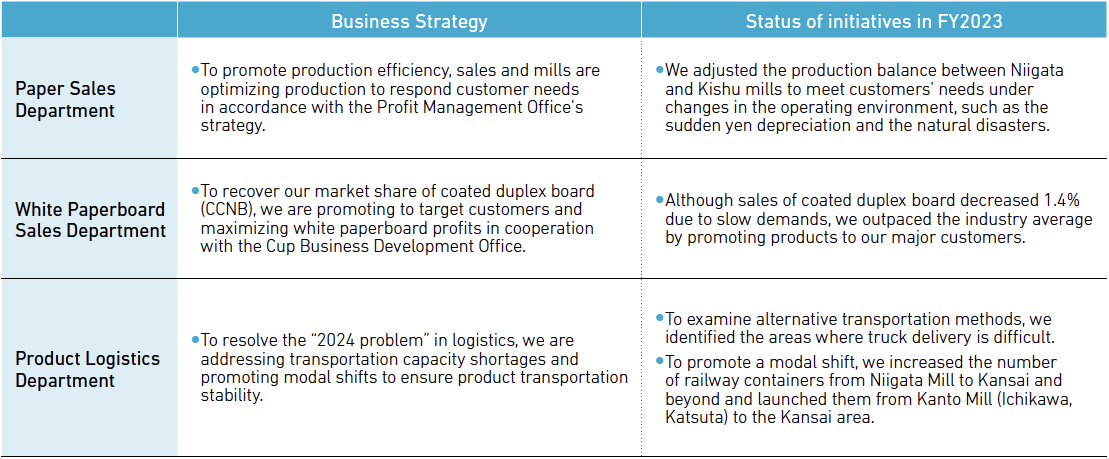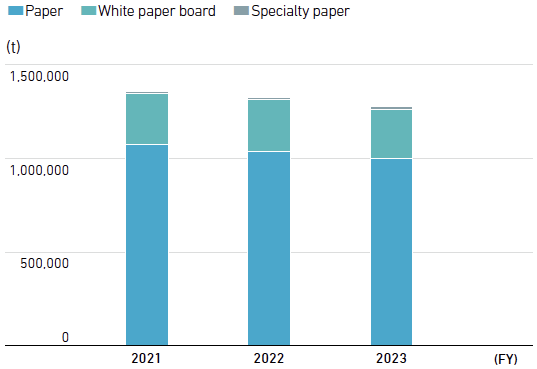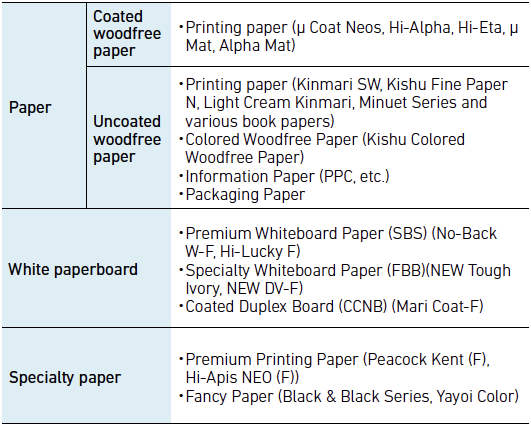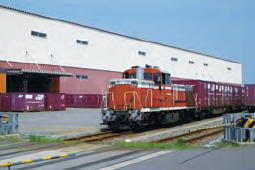Paper and White Paperboard Business
FY2023 in review
In FY2023, which was the first year of Medium-term
Management Plan 2026, we pushed our sales activities
in four departments: the Paper Sales Department, the
White Paperboard Sales Department, the Product Logistics
Department, and the International Export Department. Through
communication with various customers, we adapted our sales
strategies for demand changes.
Significant yen depreciation has caused a sharp increase in raw materials and fuel prices, as well as pushing up logistics costs.
As a result, we have made some adjustments to our product
lineup. Meanwhile, we have been facing a noticeable decline in
demand for graphic paper, which is our core product in the fine
paper business. In addition, we have actively communicated
our environmental initiatives to our customers, emphasizing
the superior environmental performance of our products and
promoting the development of environmentally friendly products.
Summary of the Domestic Paper and White Paperboard Sales Division

■ Paper and White Paperboard Business: Production

■ Major products (brands)

Business strategy going forward
In April 2024, the start of the second year of Medium-term
Management Plan 2026, we introduced a new organizational
structure with the establishment of the Domestic Paper & White
Paperboard Sales Division and the Global Trading Division.
We also made a clear delineation between the domestic sales
department and the international export department.
The Domestic Paper & White Paperboard Sales Division
aims to secure our market share in the Japanese market
even amid its challenging conditions, taking into account
the price adjustments in FY2022 on both paper and white
paperboard. We will strive to maximize profitability through
production and sales strategies that adapt to changes.
Paper Sales Department
We will maintain our existing customer share and build new
sales channels by highlighting our environmental advantages
and proposing paper solutions with an accurate understanding
of the highly volatile market. We also establish a flexible
production system utilizing our main mills, the Niigata and
Kishu mills. With the Profit Management Office, we aim for
maximum profitability through optimized production.
In coated paper, we will maintain sales volume by
implementing an order-taking system that remains closely aligned with the market and by producing and shipping
products to users in a timely manner.
In uncoated paper, we will secure a market share by making
targeted approaches to various customers and by managing
inventories to minimize the loss of sales opportunities. For our
premium Color Woodfree paper, celebrating the 70th year of
sales in FY2024, we will focus on stimulating demand through
promotional items and strengthening our dealer relationships.
White Paperboard Sales Department
We will recover and further expand sales volumes in various
categories, including high-end white paperboard, specialty
white paperboard, and coated duplex board, by promoting
target users. We will ascertain customers’ needs and work
closely with our mills and Product Logistics Department to
consistently deliver better products to our customers.
In addition, we aim to expand our sales by developing new
products that use plastic-free materials with the Paper Cup
Business Development Office and the Product Development
Office. We will also continue to engage in face-to-face sales
in order to be chosen by our customers so that we will
outpace industry standards.
Product Logistics Department
To address the “2024 problem” in logistics, we have introduced a
dynamic management system provided by Hacobu, Inc. at each
of our mills to manage truck drivers’ wait time. This approach has
reduced their wait time substantially; currently, across all mills, the
wait time could be minimized within two hours for more than 95%
of drivers. Going forward, we will conduct monthly inspections and
continue support to maintain this level of efficiency.
As part of our strategic business alliance with Daio Paper
Corporation, we have launched three regional groups for the
East Japan area, the Central and Kansai area, and the West
Japan area, and each group has commenced its activities. We
will calculate the benefits this approach brings over the threeyear
period from FY2024 and realize the effects of the alliance,
such as reducing costs and enhancing transportation efficiency.
CLOSE UP: Reducing the environmental impact of transportation
The Group is promoting a modal shift away from trucking, which has a higher
environmental impact, to more environmentally friendly transportations such
as railways. This helps us lower CO2 emissions in the transport of raw materials
and products. As a result of this effort, we can reduce CO2 emitted during
transportation by around 80–90%.
In addition to using railways, the Group aims to improve transportation efficiency
by employing its own 20ft containers specifically for roll products and by building
a dedicated railway line within the Niigata Mill. By strengthening rail container
transportation, we will accelerate the modal shift and reduce CO2 emissions further.

Rail transport using a dedicated line in the
Niigata Mill